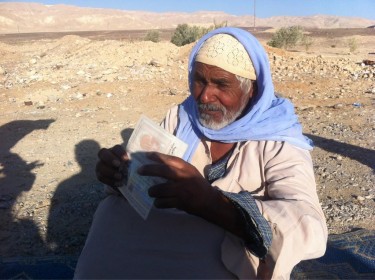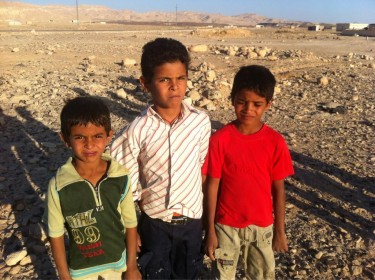Stateless [1]people are those who do not have a nationality. According to the United Nations Refugee Agency (UNHCR), there are up to 12 million stateless people in the world.
Sometimes the concept of being stateless is confused with refugees. However, many stateless people are not refugees as they have never crossed any international border. While the Universal Declaration of Human Rights [2]affirms that everyone has the right to a nationality and prohibits the arbitrary deprivation of nationality, stateless people exist due to different reasons; gender, ethnic and religious discrimination are among main factors.
Stateless people usually suffer from multiple forms of human rights violations and lack of access to basic rights such as education, employment, healthcare, and political participation.
Statelessness is not uncommon in the Arab world. Palestinians are a prime example as their nationality is not recognized by other countries. Also, those who live in Jerusalem but didn’t apply for Israeli citizenship are without nationality. Bidoon (without nationality) people of Kuwait and other Gulf countries, Sahrawi refugees [3] in Algeria, and the black minority in Mauritania [4] are other examples of stateless people in Arab countries.
National laws that prevent mothers from transferring nationality to their children if the father is not a national is also one of the main reasons for statelessness in different countries, such as Iraq and Oman.
While the issue of statelessness doesn’t get much visibility, some activists have been raising their voices and using social media to highlight it. In Kuwait, online advocacy is an important tool for shedding light on the plight of Bidoon people. Global Voices author Mona Kareem [5] has started Bidoon Rights Blog [6] to document the situation of this community in Kuwait.
In Egypt, Abdullah Elshamy [7], a reporter for Al Jazeera [8]shared on Twitter the details of his visit to the Azazma tribe in the East of the Sinai Peninsula.
Elshamy tweeted:
نوتات عن البدون في مصر: كنت اليوم في زيارة الى قبيلة العزازمة في شرق سيناء قرب الحدود مع فلسطين مسافة ١٥٠ كيلومتراً من العريش #بدون_مصر
@abdallahelshamy [9]: Notes on statelessness in Egypt: Today I was visiting Azazma tribe in East Sinai near borders with Palestine; 150 km far from Arish.
He added:
هذه القبيلة تعيش منذ عشرات السنين هنا دون جنسية مصرية . لا توجد عندهم سوى وحدة صحية دون موظفين و التراب يعلو كل شيئ فيها #بدون_مصر
@abdallahelshamy [10]: This tribe has been living for decades without Egyptian nationality. They only have one health unit with no staff and it is totally covered with dust.
He continued:
قال لي شيخهم: نريد من الرئيس مرسي الذي سمعنا عنه أنه رجل عادل أن يحل مشكلتنا لكي يستطيع أبنائنا السفر والعمل #بدون_مصر
@abdallahelshamy [11]:The tribe leader told me: We heard that President Morsi is a just man and we demand that he solves our problem so that our sons could travel and work.
Azazma tribe is a nomadic society that is spread out between Negev [12]and Sinai deserts on both sides of the Egyptian and Israeli borders. The tribe members in Sinai number between 3,000 to 5,000 people. After the Israeli occupation of Sinai ended, Azazma tribe members on the Egyptian side expected to obtain the Egyptian nationality, but were only left with “passage documents” with unidentified nationalities.
In a blog post [13] from 2008 entitled Azazma, people of the border or border for the people?, blogger and poet Ashraf AlAnany ponders difficult questions regarding the history of Azazma, their complex relationship with Israel and the perceived lack of loyalty to Egypt which propagates their statelessness. AlAnany wrote:
أعتقد أننا هنا أمام خيارين لا ثالث لهما , أولهما أن يستمر وضع هؤلاء علي الحدود هكذا مرشح علي الدوام كبؤرة توتر ، هم مواطنون “ بدون “، فكيف نطالبهم بالانخراط في هذا البلد ومعاملتهم كأبنائه ، لهم ما لأبنائه من حقوق وعليهم ما علي أبناءه من واجبات ؟؟؟؟؟
أما الخيار الثاني الذي أعتقد أن كثيرين سيعارضونه فهو أن تعطي مصر الجنسية لهؤلاء ، وهو خيار سيقول من يعارضه بأن عزازمة 1953 مهجرون تم تهجيرهم من قبل قوات الاحتلال ، وسيقول المغالون : كيف تعطي الجنسية لأبناء قبيلة يشتغل بعضها مع الإسرائيليين كأدلاء وقصاصي أثر في سلاح الحدود ” مشمار قفول ” وكجنود أو ضباط في الكتيبة البدوية ، كيف نضمن ولائهم في وضعية كهذي
I believe we have one of two options; the first is to continue their situation at the border and continuously remain as a tension point. They're without nationality so how do we demand them to be integrated in this country and treat it as its citizens with all the rights and duties.
The second option, which I believe would be opposed by many, is that they become Egyptian nationals. The opponents would say that the Azazam of 1953 were forcefully displaced by occupation forces. Others may take the argument to another level and say “How do we give nationality to a tribe that works with Israelis as guides in the Border Guard Division and as soldiers or officers in the Bedouin Troops, how do we ensure their loyalty?”
Elshamy shared photos from his visit to the tribe:
 [14]
[14]A photo of one of the tribe’s sheikhs showing his passage document; the only official paper he has. Photograph shared by @abdullahelshamy [7] on Twitter
 [15]
[15]A photo of children of the tribe, by @abdullahelshamy [7]
The Azazma tribe, however, are not the only stateless people in Egypt. Since Palestinians who fled to Egypt and other Arab countries were not granted citizenship and lost their original citizenship, many of them are now stateless. Other than that, small numbers of people of Armenian origin are stateless in Egypt. Children of mixed Ethiopian-Eritrean origins can also be stateless and some of them seek asylum in Egypt.
Until recently, people of the Bahai’ faith [16] were not able to obtain official documents such as birth certificates or national IDs as their faith was not recognized by the state. In 2008, the Administrative Court ruled that Bahai’s could be issued documents without mentioning their religion, deemed as a historic step [17] towards integrating them.
The UNHCR has started a campaign [18] last year to combat statelessness, encouraging countries to sign agreements related to reducing statelessness. Except for Tunisia, Libya and Algeria, Arab countries did not sign these conventions.